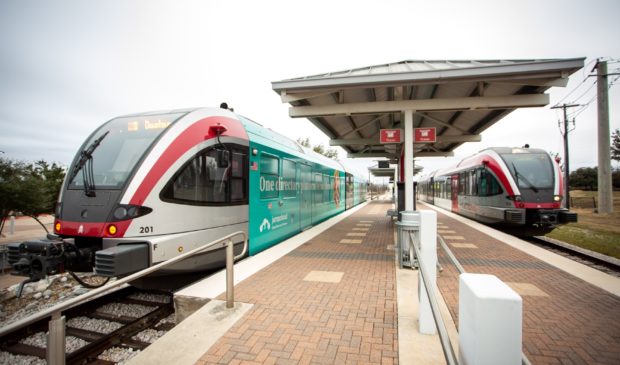Photo by Gabriel C. Pérez/KUT
After Leander vote secures transit service, Cap Metro looks to ‘win over’ skeptics
Tuesday, May 10, 2022 by
Nathan Bernier, KUT Now that Capital Metro service in Leander is secure for at least five years following Saturday’s election, the regional transit agency wants to get opponents on board with spending a 1 percent sales tax on public transit.
Proposition A asked Leander voters whether to cancel transit service and stop paying the tax to Capital Metro. The 1 percent sales tax generated almost $10 million last year, and revenue is on track to grow by 28 percent this year.
Some 59 percent of voters supported keeping Capital Metro service and the accompanying sales tax. More than 2 out of 5 voters opposed the arrangement.
“We still need to win them over,” Capital Metro’s Sam Sargent said of Leanderites who wanted to end the 37-year partnership.
How should Capital Metro do that?
“I think providing good service day in and day out, but also just making sure that we state our case,” Sargent said. “Just going out there and very honestly saying, here’s what we do. Here’s where we are.”
But Capital Metro faces some big challenges.
Transit ridership in Leander remains stubbornly below pre-pandemic levels with one big exception: the on-demand transit service Pickup.
Pickup, which lets people order a minibus in about 15 minutes with an app or phone call, had 1,861 riders in Leander’s service zone in February, according to data provided by Capital Metro. That’s about triple the number from a year earlier.
Commuter rail and commuter bus ridership, on the other hand, have not recovered since many Leanderites were offered the flexibility to work from home because of Covid-19.
Weekday MetroRail boardings this year averaged 145 through February, about half pre-pandemic levels. Still, ridership is more than double what it was a year earlier.
MetroExpress is down even more. Weekday boardings averaged 31 through February, about a 10th the ridership just before the pandemic. So few people are taking the commuter bus from Leander that Capital Metro suspended one of two routes in January.
But Capital Metro hopes rail projects in the works will make the train more appealing to Leanderites.
A pair of new stations will allow easier to access to the Domain and Austin FC’s stadium. On days with soccer games, boardings at Leander’s MetroRail station can be double or more the average weekday ridership.
Capital Metro is also working to add a second set of train tracks along the Red Line between Leander and Lakeline. The double track project would allow trains to run more frequently to and from Leander.
“We’re getting closer and closer to pulling down our frequencies so we can really be relied on the same way a good 15-, 20-minute bus service could,” Sargent said.
The double track project is slated to be completed this fall, but the plan for increased frequency of service is further out, more of a “medium- to long-range plan,” Sargent said.
Leander residents can also expect millions in infrastructure funding to start flowing in the coming months.
The city is eligible for $7.4 million from a one-time infrastructure fund created by the Capital Metro board. Leander can also start receiving sales tax rebates over what it costs Capital Metro to provide transit services. This year, the amount is calculated to be just under $2 million.
With both funds, Leander must identify projects and submit them to Capital Metro for approval. The work could include things like sidewalks, road resurfacing, lighting, intersection improvements – as long as they benefit transit customers.
If Capital Metro really wants to earn the support of more Leander residents, the agency should expand service to more areas of the city, Leander Mayor Christine DeLisle said.
“Cap Metro should have heard the calls for more equitable services, transportation for our community’s disabled and transparency in the costs of services provided to our residents,” DeLisle said in a statement Monday.
Leander can’t hold a similar election on Capital Metro membership for at least five years, the city and Capital Metro said.
That timeline has left opponents of Capital Metro membership doubtful that Leander’s service levels or ridership will see big improvements.
“You’d have to be high to think that,” said Mike Sanders, a Leander resident who used money from an unsuccessful City Council bid to campaign against Proposition A.
“They just lucked themselves into the sweetest deal they could possibly want,” he said. “They don’t have to change anything they’re currently doing, and there’s nothing we can do about it.”
This story was produced as part of the Austin Monitor’s reporting partnership with KUT.
The Austin Monitor’s work is made possible by donations from the community. Though our reporting covers donors from time to time, we are careful to keep business and editorial efforts separate while maintaining transparency. A complete list of donors is available here, and our code of ethics is explained here.
You're a community leader
And we’re honored you look to us for serious, in-depth news. You know a strong community needs local and dedicated watchdog reporting. We’re here for you and that won’t change. Now will you take the powerful next step and support our nonprofit news organization?







